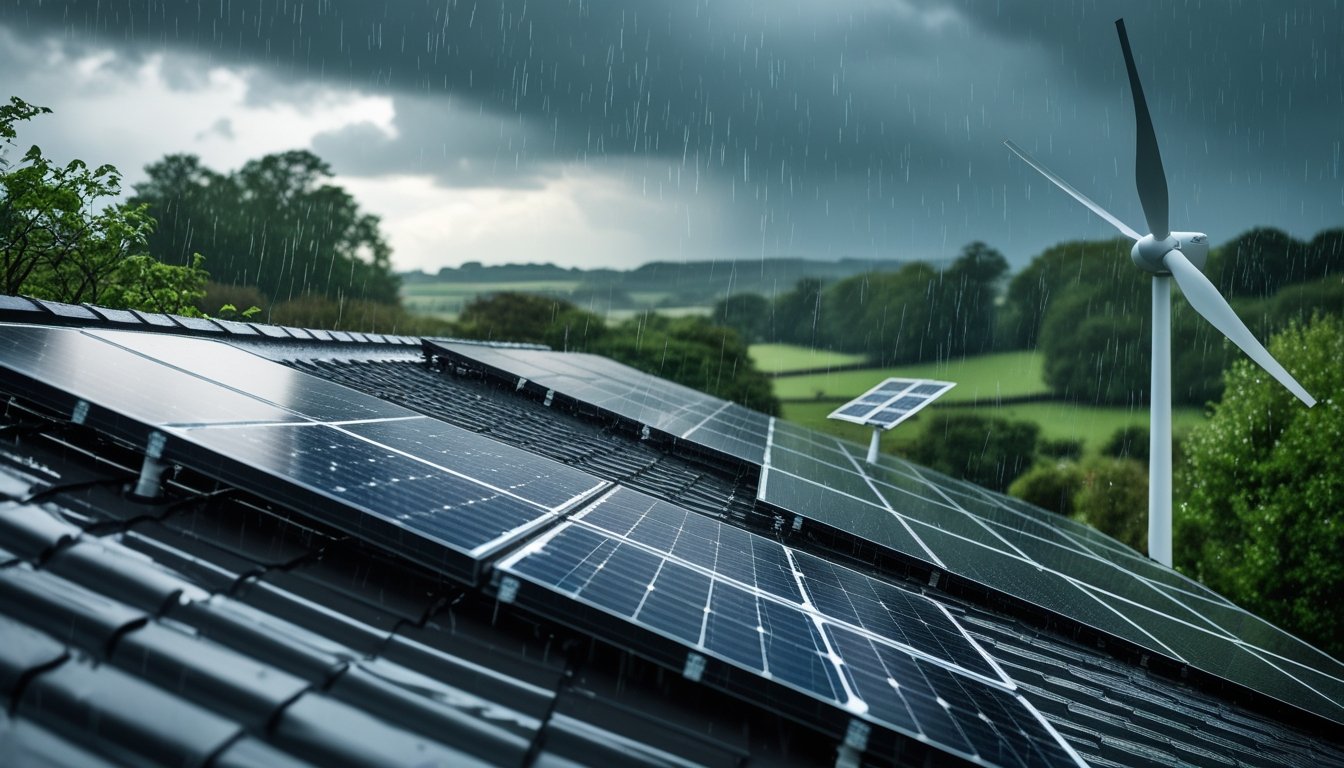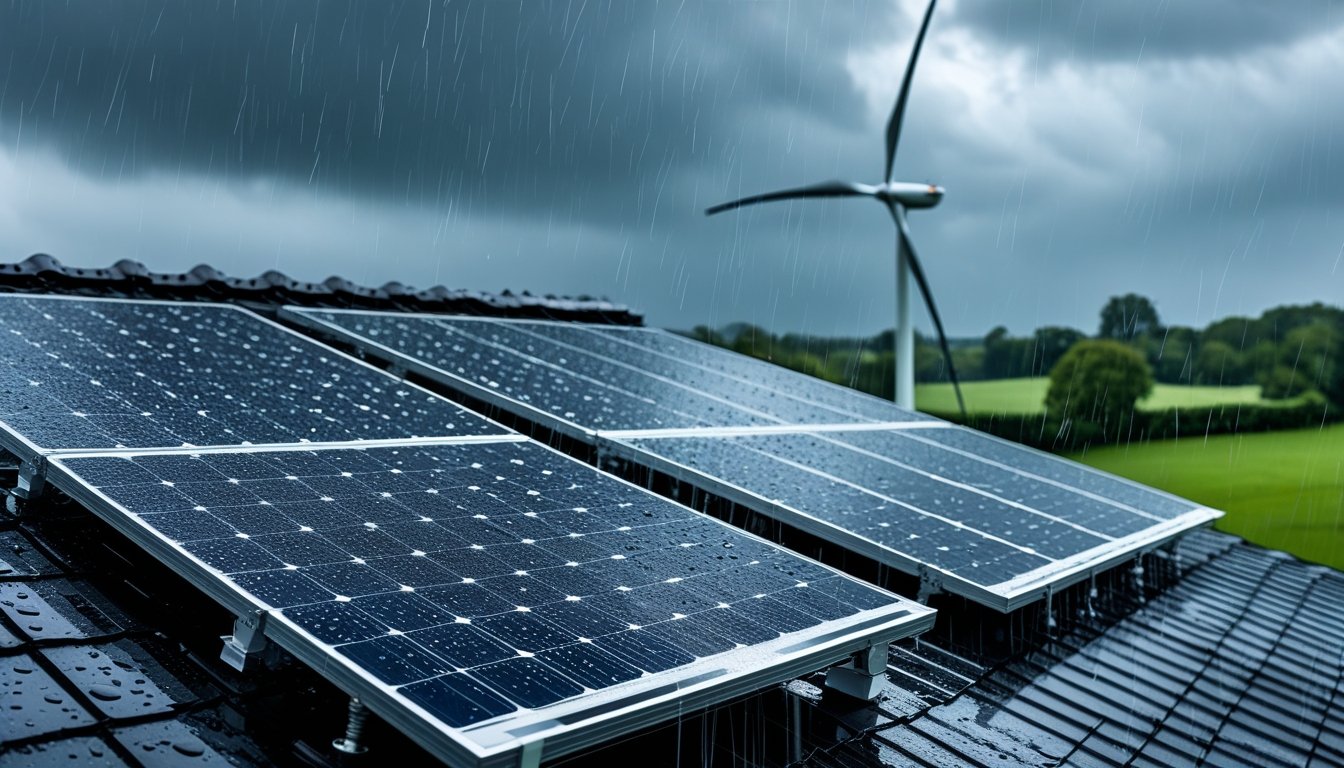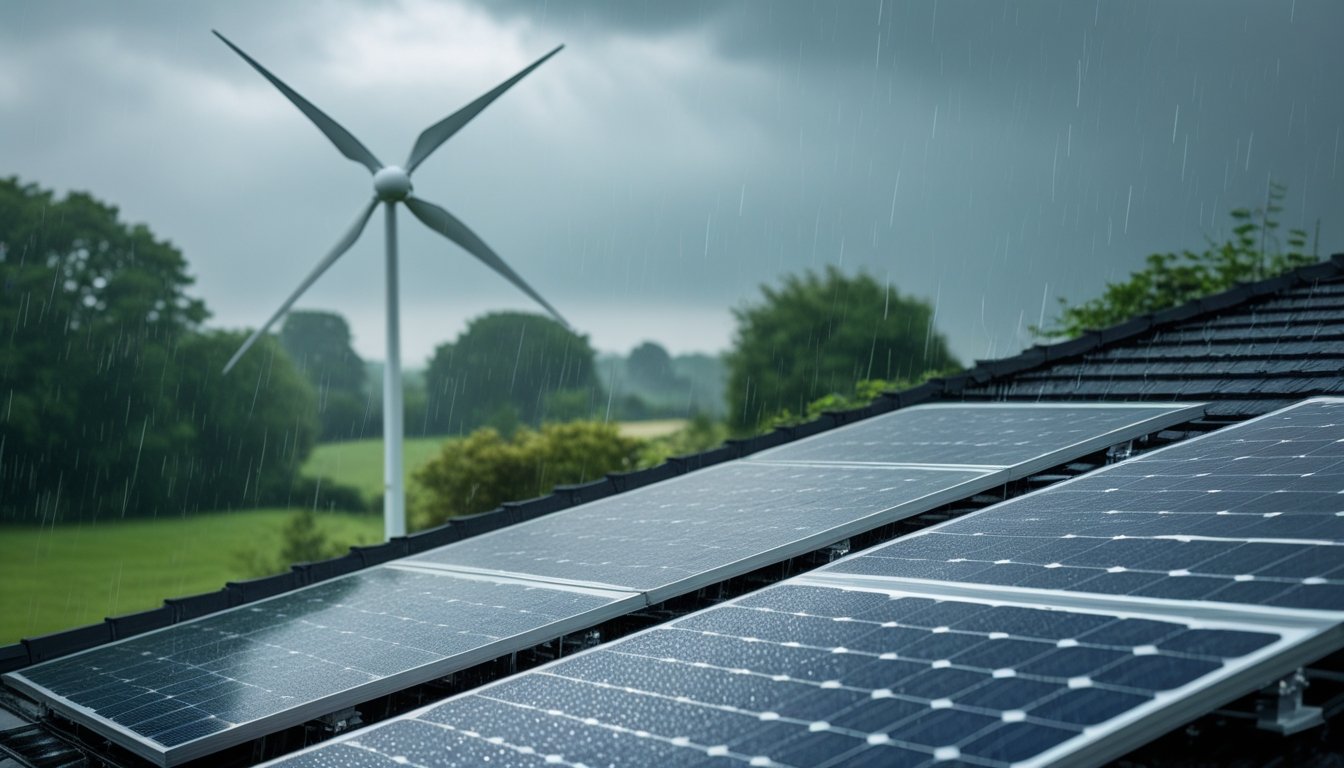Late updated: 01 Sep 2025 10:09
Written by: Eleanor Hartman
Alternative Energy Solutions For UK Rainy Seasons: Harnessing Nature's Power
The unique challenges posed by the UK's frequently rainy climate might lead some to question the effectiveness of alternative energy solutions like solar panels. Contrary to popular belief, solar energy remains a viable option, even in our cloudy conditions. By harnessing diffused sunlight, solar panels can still generate a significant portion of energy, emphasising the resilience and adaptability of modern renewable technologies.

This adaptability extends beyond just solar power. Advanced solutions, such as hybrid systems that integrate solar, battery, and grid energy, ensure a steady power supply throughout the year. These innovations not only mitigate the impacts of inclement weather but also enhance our energy independence and reduce reliance on the national grid.
Exploring alternative energy solutions for rainy seasons reveals opportunities to advance our energy sustainability goals. Paired with the UK’s commitment to achieving Net Zero carbon emissions, renewable energy technologies stand ready to overcome the challenges posed by weather, offering both economic and environmental benefits.
Key Takeaways
- Solar panels remain effective in cloudy UK weather.
- Hybrid energy systems ensure year-round power supply.
- Renewable energy is crucial for UK sustainability goals.
Key Alternative Energy Solutions for UK Rainy Seasons
In the UK's typically overcast and rainy climate, reliable alternative energy solutions are essential. We explore how modern technologies make renewable energy feasible even in less sunny conditions, focusing on solar power, battery storage, and hybrid systems tailored for the UK's unique weather patterns.
How Solar Power Performs in Overcast and Rainy Weather
Solar power remains a viable option in the UK, even during overcast and rainy periods. Photovoltaic (PV) panels are designed to capture sunlight efficiently, including diffuse or indirect solar radiation.
The key is that solar panels can still operate at around 10-20% of their usual capacity during cloudy days. In some periods, rain can help by clearing dust and debris, improving panel efficiency. We've also noticed a trend towards optimising the placement and angle of panels to maximise exposure to available sunlight. Leveraging the strengths of solar power effectively requires advanced technologies and careful planning.
Battery Storage for Energy Continuity
Utilising battery storage solutions is crucial for maintaining energy availability when the weather is less than ideal. Energy storage systems store excess power generated during sunnier days, making it available when production dips.
Modern battery systems focus on high capacity, long lifespan, and quick charging times. Lithium-ion technology is particularly prevalent due to its efficiency and reliability. This ensures a seamless energy supply despite fluctuations in weather or sunlight availability, offering households and businesses a dependable backup option to traditional grids.
Optimised Solar PV and Inverter Technologies
Technology has continued to advance, making solar PV systems more adaptable to diverse weather conditions. Inverters, for instance, play a pivotal role in converting the DC electricity generated by solar panels into AC electricity for use in homes.
Modern inverters can operate efficiently even during periods of varying sunlight, enabling systems to maintain high performance under less-than-ideal conditions. Additionally, solar PV systems now come with enhanced monitoring capabilities, allowing users to track performance and identify inefficiencies quickly. The combination of these technological advancements ensures maximum energy conversion and utilisation, regardless of weather.
Hybrid Energy Systems Catering to UK Climate
Hybrid energy systems integrate multiple renewable sources to increase overall reliability and effectiveness, particularly in the UK's unpredictable climate. These systems typically combine solar panels with wind or hydroelectric power, balancing the strengths and weaknesses of each.
In the UK, businesses and homeowners employ these systems to ensure a steady energy flow, taking advantage of wind and solar energy depending on what's available at any given time. By diversifying energy sources, hybrid systems reduce reliance on any single technology, providing more consistent output and reducing vulnerability to weather variability. This comprehensive approach not only enhances energy security but also contributes to sustainable energy goals.
Enhancing Energy Independence and Sustainability in Challenging Weather

In rainy conditions, maintaining energy independence and sustainability is crucial, especially as the UK seeks to reduce reliance on fossil fuels. This involves managing energy efficiently, supporting heating and electrical needs with sustainable solutions, and leveraging government incentives to encourage adoption of alternative energy sources.
Smart Energy Management for Maximising Efficiency
Effective management of energy resources is vital for achieving independence. Smart energy management systems enable us to monitor and optimise energy use across homes and businesses. By integrating renewable energy sources like solar and wind with real-time data analysis, these systems can predict energy demand and allocate resources efficiently.
This reduces energy waste and enhances grid stability, even during challenging weather conditions like heavy rainfall. Smart meters and AI-driven platforms are pivotal in providing actionable insights for maximising energy efficiency, contributing to a more resilient energy network.
Supporting Heating and Electrical Demand with Sustainable Solutions
Meeting heating and electrical demand in rainy seasons requires innovative and sustainable approaches. Incorporating heat pumps, solar thermal systems, and efficient insulation addresses heating needs while minimizing environmental impact. These technologies can significantly reduce energy consumption and enhance comfort, even in unfavourable weather.
In addition, integrated energy systems combining solar panels with battery storage solutions offer a reliable source for electrical demand. They capture and store energy during sunnier periods, ensuring consistent power supply even during extended periods of rain. This not only cuts costs but also ensures energy security.
Government Incentives and Schemes for Alternative Energy Adoption
Government initiatives play a crucial role in promoting the switch to renewable energy, particularly in challenging weather conditions. Financial incentives, like grants and tax breaks, make the adoption of alternative energy solutions more accessible to households and businesses. For instance, the UK government’s Renewable Heat Incentive supports the installation of green heating systems.
Moreover, schemes like the Smart Export Guarantee encourage the use of solar energy by allowing users to sell excess power back to the grid. Such measures not only advance sustainable energy goals but also support our move towards greater energy independence, creating a robust market for alternative energy solutions.
Frequently Asked Questions

As we explore the use of alternative energy during the UK's rainy seasons, we consider innovative technologies like triboelectric nanogenerators, the best rain energy generators for homes, and strategies to manage energy production challenges.
How can triboelectric nanogenerators be integrated into urban environments to enhance energy capture during rainy seasons?
Triboelectric nanogenerators (TENGs) can be installed on building surfaces such as roofs and windows. These devices convert the mechanical energy from raindrops into electricity, providing an additional energy source in urban settings. TENGs are lightweight and can be adapted to fit various structures without significant modifications.
What are the most effective types of rain energy generators currently available for domestic use in the UK?
In the UK, piezoelectric rain energy generators are a popular choice for domestic use. These devices utilise the force of raindrops to produce power. Another viable option is installing micro-hydro generators in residential settings with sufficient water flow, enabling energy generation even in periods of continuous rainfall.
How do dark doldrums affect energy production, and what are the mitigation strategies?
Dark doldrums refer to prolonged periods of heavily overcast weather. These conditions can reduce the efficiency of solar panels. To mitigate this, energy storage systems can store excess energy produced on brighter days for use during these periods. Additionally, diversifying to include wind or rain-based energy systems can provide balance.
What advancements have been made in the usage of rain panels for generating electricity?
Recent advancements in rain panel technology focus on efficiency improvements through materials that enhance energy capture. Enhanced surface designs have been developed to increase raindrop impact capture, while new materials in the panels convert mechanical energy more efficiently, leading to better electricity generation even during lighter rainfall.
In what ways can householders contribute to energy generation during prolonged periods of overcast weather?
Householders can incorporate energy-efficient practices such as using energy-saving appliances and integrating home energy management systems. By pairing solar panels with complementary systems like rain or wind turbines, they can ensure a more consistent energy supply, even when sunlight is scarce.
Can TENG solar panel technology be considered a viable alternative to traditional solar panels in areas with high rainfall?
TENG solar panel technology shows promise in regions with frequent rain, as it can generate electricity from both sunlight and rainfall. While traditional solar panels are effective in capturing solar energy, the hybrid nature of TENG panels allows them to harness multiple energy sources, providing a versatile solution for areas with significant rainfall.